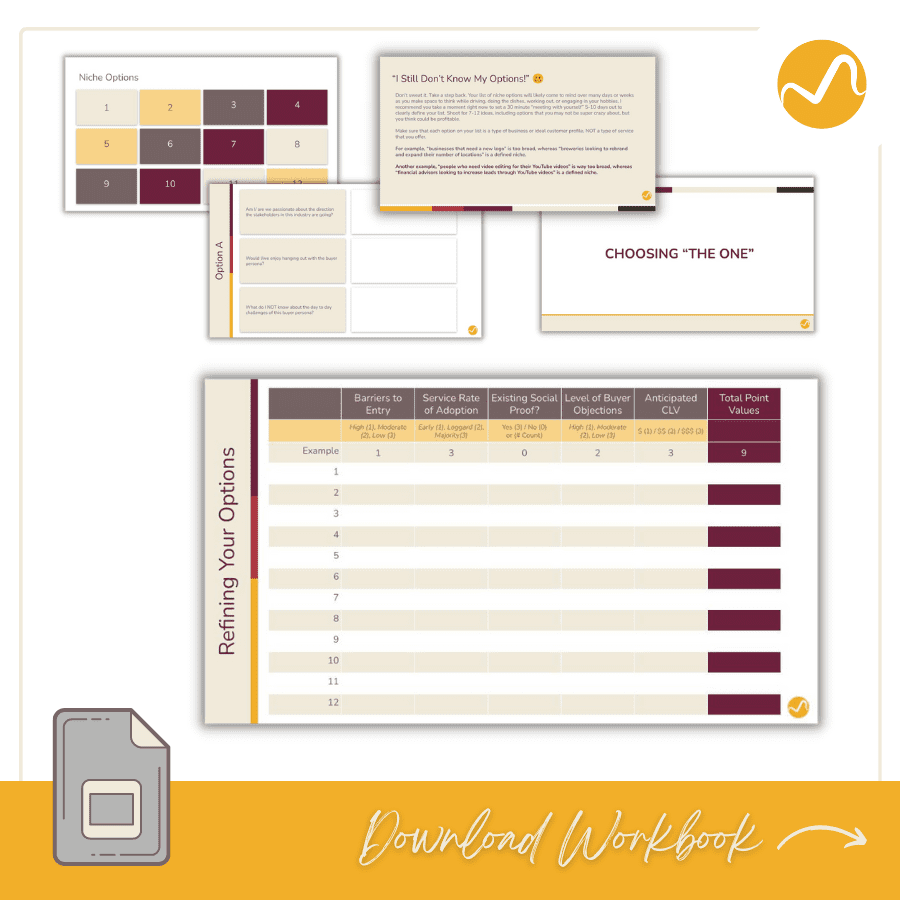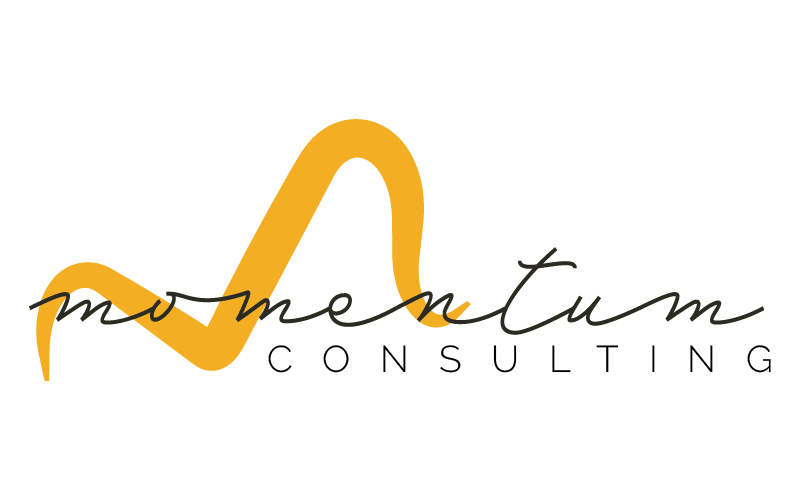Written By Danielle Fauteaux
Clarity, focus, and boundaries are critical for you to define in all aspects of your business, and each is essential to define specifically regarding your target audience and ideal customer.
Often times creative agencies and marketing services providers get excited because they have the means to service almost any business, without geographic boundaries and in a seemingly endless number of ways. But, just because you CAN service any kind of business, anywhere, and in so many ways doesn’t mean that you SHOULD.
When You Define Your Niche, Unfamiliar Things Start to Happen…for the Better.
1. Business Development Becomes Easier to Grapple With
It becomes easier to market from a customer-centric stance because it’s easier to understand your buyer. Consider, that when people hire an internal marketer, the applicant with industry experience often has a leg up on other applicants. Why? Because they “get it” more than the others. Or at least the “get it” sooner than the other will. The same applies to agency evaluation.
It’s easier to determine what kind of content to write. A specified set of buyer personas has a more specific set of problems that you can then craft your message around to solve for the customer. Will you ever have only one buyer persona? Unlikely. Can you refine your buyer personas more and more to match the kinds of personalities and people who tend to work in a certain industry who reach out interested in your assistance? Certainly.
Your content has the potential to rank better in search engines. There are approximately 720,000 new blogs published every day. This fact alone makes it really hard for small businesses and even fully established, but happily smaller agencies to rank for generic marketing and technology type tips because of the big names in the space like HubSpot, Moz, SearchEngineLand, eMarketer, etc, etc.
You can grow your audience faster. Because you’re focused on a particular niche with a more narrow set of challenges, you can build non-generic resources that are actually unique and helpful to your audience. For example, a website visitor who is a restaurant owner is more likely to download a template of best social media posts for restaurants than they are to download a generic guide to social media marketing. They can get the generic content from other sources, but to find a template that streamlines their personal social media promotion workflow is a rare find.
Remember, Conversations Lead to Consultations, That Lead to Clients.
It becomes apparent which circles to insert yourself into. You’ll have a clearer understanding of who to connect with in person, on LinkedIn, and via industry specific associations and peer to peer communities.
Not to mention, as your audience grows and your salespeople continue connecting with people in a specific industry, network management tools like LinkedIn will start doing the legwork for you; their algorithms will float up to the surface new contacts for your team members to connect with based on mutual connections and shared interests in the industry you’re narrowed in on.
2. You Get to Explore
As you focus in, you’ll get more curious about specific problems in that industry and how to solve for those problems using your skillset. As a result, you (and everyone on your team) can deepen your knowledge and sharpen your tools of the trade. As you sharpen your tools of the trade, you will been more people in the industry and create new opportunities for yourself and your agency.
You can find your voice. Become the big fish in the small pond rather than the small fish in the big pond. Once you find your voice, you’re more likely to be invited to share your perspective at niche specific events.
You can uncover tricks of the trade that work for your niche unlike any other. You can tweak other strategies that work fine and dandy for other industries to work better for your niche in particular. (Then you have the foundation of results for some amazing case studies to back up your claims of industry expertise.)
3. You’ll Be More Respected by Prospects and Clients
You can disqualify non-fit prospects and stop wasting your time on sales conversations that were never likely to close. Once you focus on a niche, it become easier to say “no” to bad-fit clients that you previously might have said yes to.
Clients trust you and respect you more because you’re seen as an advisor. Further, initial sales conversations will often have a deeper grounding already for those who have followed your content and see that you know their challenges.
You become the thought leader in the space — the expert brain, not the hired hands. You’ll find yourself having clients tell you how much money they have to spend with you and giving you the reigns to decide how to spend it to make them more money while they go about their own business.
Once established as a thought leader in the industry, clients will ask for your advice more and micro-manage you less. The plethora of benefits of this alone makes niching worth it, in my opinion.
Your sales close rate will likely increase (and time to close often decrease). This is a ripple effect of writing better content, engaging in better sales conversations that get to the heart of their issues, and being seen as a trusted advisor as opposed to being a vendor.
4. You Can Reset Your Pricing Strategy and Increase Profit Margins
You can increase your prices. Because you’re not selling commodities and instead you’re selling industry expertise that happens to manifest into X, Y, Z deliverables, you can truly turn the conversation into one of a marketing investment rather than a marketing expense.
You can form a client waiting list without losing all interested buyers. They know the value of waiting for the right team, with the right experience and the right ideas to come alongside their business.
You can be more confident in your offerings, your value proposition, and in your proposals.
You can clearly identify competitors and pinpoint ways to offer a better value proposition to clients than your competitors do.
As AI continues to disrupt the agency space and execution work becomes further commoditized, the agencies that are positioned to add unique value to clients that cannot be replaced, will continue to find new opportunities. Be the kind of agency that clients see as an irreplaceable advisor.
You can scale products and services in less time (and for a premium price.) When you service a certain industry or niche otherwise, you can develop templates and processes to streamline your workflow and delivery. This allows you to scale workload and team size without as many things breaking. (Because growth always breaks stuff at least a little).
5. Agency Operations and Client Delight Will Also Improve
You can hire staff better. As you grow and scale within the niche, you’ll know better what roles need filled, how often, and by what kind of applicant.
You can hire better staff. You’ll find yourself asking better questions during interviews and identify stellar candidates that have not only the technical and personal skills you seek, but also the background to contribute more meaningfully to your organizational goals and the goals of your ideal client base.
You can train staff more thoroughly. It’s like when you’re physically training. If you know you’re running a marathon, you’ll train differently than if you know you’re running the 100 meter dash. When you know exactly what kinds of clients you’ll be onboarding, you can work those muscles and be prepared to win them right from the start.
You can delight clients in repeatable, scalable ways that they appreciate more fully and cost you less in overhead.
You will find yourself making more informed business decisions based on the business trends in the primary niche you service (and more of your new initiatives will have legs to stand on for this reason too).

Niche Picking Workbook [How to Niche Down]
Simply submit the form below to access a Google Slides Deck that will allow you to brainstorm, refine options, and assess the viability of niche options. The riches ARE in the niches, as they say.
“But, I Don’t Want to Be Stuck In A Box”
Many feel as though by defining an industry niche they are boxing themselves in. But it’s actually the opposite. By not defining an industry niche, you’re actually limiting your business potential because
- Your development, marketing and creative services are often viewed by prospects and clients as commodities, which compete based on price and availability. Your niche specific knowledge that has been gained over time and through effort is an actual differentiator and supports a truly unique value-proposition.
- When you are forced to compete on pricing and availability, you and your team will feel overworked and underpaid.
- When there’s not enough profit left over to develop the business further, the business will stagnate. It takes more effort to get something moving than it takes to keep something moving, so consistent re-investment in your business each year is critical.
- Because it’s harder to have a customer centric focus in your marketing and business development activities that resonates with buyers, you’re often relegated to throwing spaghetti at a wall and hoping some of it sticks.
- You have less meaningful business relationships and partnerships to prop your business up on. Your network is smaller and more fragmented. This goes back to the concept of being the little fish in a big pond compared with being the big fish in a little pond.
To Niche, or Not to Niche
Think about your three best clients. What could happen for your business strategy and marketing strategy if you focused on one of the three niches they fit into? What could you write about to solve their problems? How did sales conversations with those clients go compared to with other clients? Does your team enjoy working on those clients and why? Would it be more manageable to keep up with industry news in their specific space to inform an insightful, consultative based selling approach.
Now the big question if you’re on the fence about niching: what’s the worst thing that could happen if you targeted a niche but after at least 12 months decide it’s better to be a generalist after all? Compare that to the outlook and financial projections if you stay a generalist right now.
Evaluate your options. Choose a route. Commit wholly for at least a season. Then evaluate again and keep rocking and rolling.
Building a successful business takes grit, a focus on your value, and sometimes a *loving* kick in the pants.
Needing an ally as you achieve your long-term goals?
I’d be happy to help.

